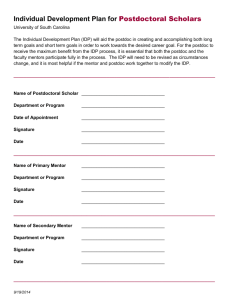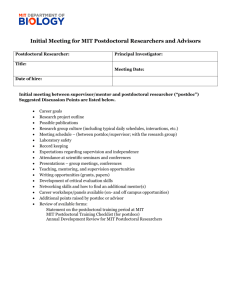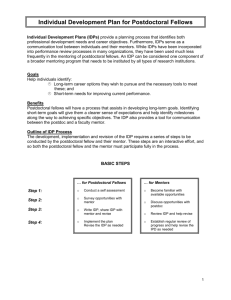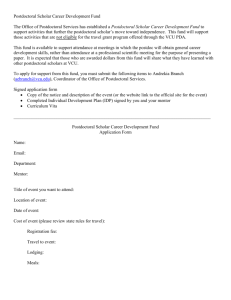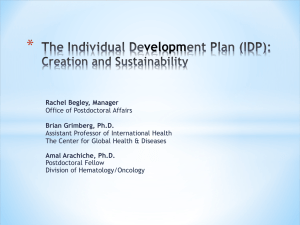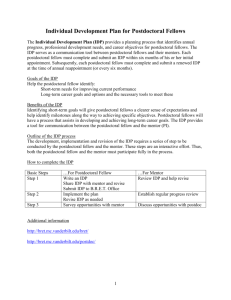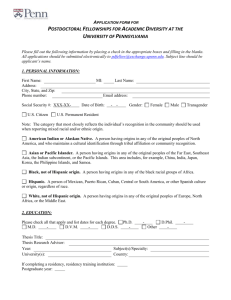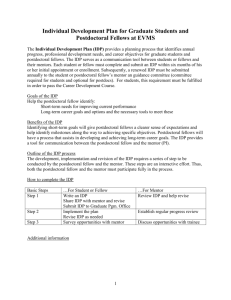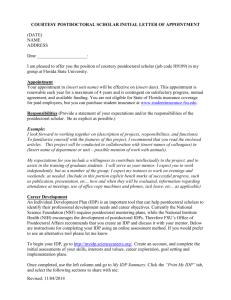to the IDP form
advertisement
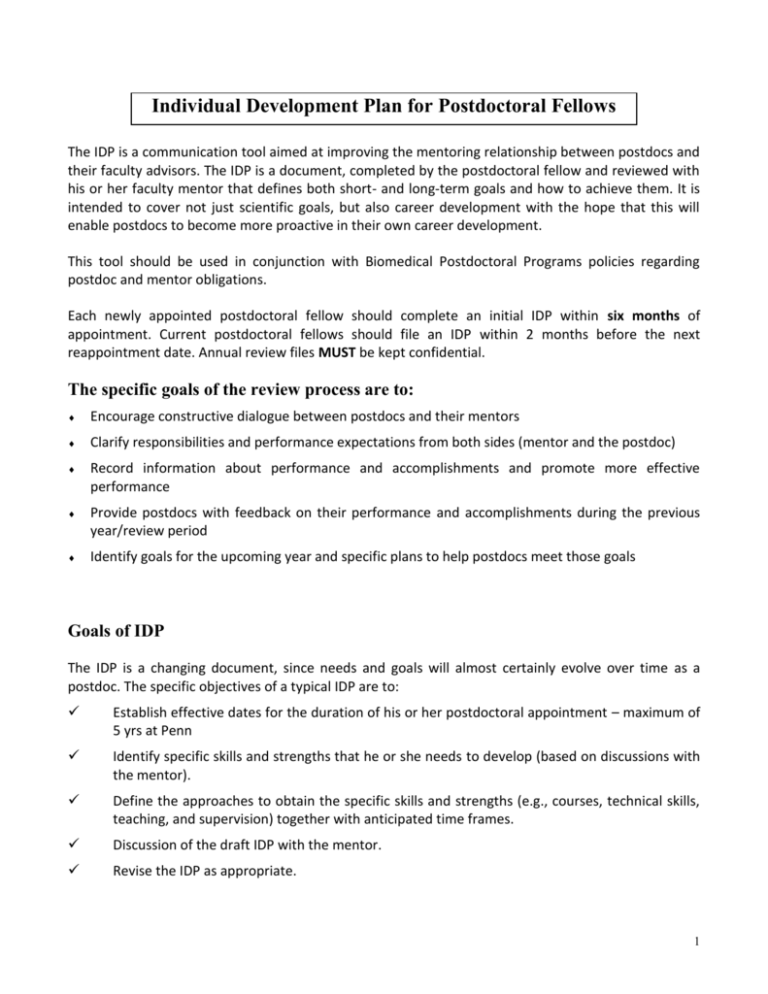
Individual Development Plan for Postdoctoral Fellows The IDP is a communication tool aimed at improving the mentoring relationship between postdocs and their faculty advisors. The IDP is a document, completed by the postdoctoral fellow and reviewed with his or her faculty mentor that defines both short- and long-term goals and how to achieve them. It is intended to cover not just scientific goals, but also career development with the hope that this will enable postdocs to become more proactive in their own career development. This tool should be used in conjunction with Biomedical Postdoctoral Programs policies regarding postdoc and mentor obligations. Each newly appointed postdoctoral fellow should complete an initial IDP within six months of appointment. Current postdoctoral fellows should file an IDP within 2 months before the next reappointment date. Annual review files MUST be kept confidential. The specific goals of the review process are to: Encourage constructive dialogue between postdocs and their mentors Clarify responsibilities and performance expectations from both sides (mentor and the postdoc) Record information about performance and accomplishments and promote more effective performance Provide postdocs with feedback on their performance and accomplishments during the previous year/review period Identify goals for the upcoming year and specific plans to help postdocs meet those goals Goals of IDP The IDP is a changing document, since needs and goals will almost certainly evolve over time as a postdoc. The specific objectives of a typical IDP are to: Establish effective dates for the duration of his or her postdoctoral appointment – maximum of 5 yrs at Penn Identify specific skills and strengths that he or she needs to develop (based on discussions with the mentor). Define the approaches to obtain the specific skills and strengths (e.g., courses, technical skills, teaching, and supervision) together with anticipated time frames. Discussion of the draft IDP with the mentor. Revise the IDP as appropriate. 1 Outline of the IDP process The development, implementation and revision of the IDP require a series of steps to be conducted by the postdoctoral fellow and the mentor. These steps are an interactive effort. Thus, both the postdoctoral fellow and the mentor must participate fully in the process. Basic Steps For Postdoctoral Fellows For Mentors Step 1: ►Conduct a self assessment ►Become familiar with available opportunities Step 2: ►Survey opportunities with mentor ►Discuss opportunities with postdoc Step 3: ►Write an IDP ►Review IDP and help revise ►Share IDP with mentor and revise Step 4: ►Implement the plan ►Establish regular review of progress ►Revise the IDP as needed ►Help revise the IDP as needed Postdoctoral Fellows Conduct a Self-Assessment Assess your skills, strengths and areas that need development. Formal assessment tools can be helpful. Take a realistic look at your current abilities. This is a critical part of career planning. Ask your peers, mentors, family and friends what they see as your strengths and your development needs. Outline your long-term career objectives. Ask yourself: -What type of work would I like to be doing? -Where would I like to be in an organization? -What is important to me in a career? 2 Mentors Step 1. Become Familiar with Available Opportunities By virtue of your experience you should already have knowledge of some career opportunities, but you may want to familiarize yourself with other career opportunities and trends in job opportunities (refer to sources such as National Research Council reports and Science career reviews). Step 2. Discuss Opportunities with Postdoc This needs to be a private, scheduled meeting distinct from regular research-specific meetings. There should be adequate time set aside for an open and honest discussion. Step 3. Review IDP and Help Revise Provide honest feedback - both positive and negative - to help postdoctoral fellows set realistic goals. Agree on a development plan that will allow postdoctoral fellows to be productive in the laboratory and adequately prepare them for their chosen career. Part One: To be reviewed by Mentor and Postdoc Obligations of Postdoctoral Fellows From the Policy for Postdoctoral Fellows at the University of Pennsylvania (Almanac 2004) Postdoctoral fellows have certain obligations to their mentor, the group in which they are working, the Department with which they are associated, the sponsor whose funds support them, and the University. These obligations include but are not limited to: (i) the conscientious discharge of their research, scholarly, and teaching responsibilities, as applicable; (ii) conformity with ethical standards in research and scholarship; (iii) compliance with good scholarly practice including the maintenance of adequate research records; (iv) observation of appropriate guidelines regarding human subjects and due observation of University standards regarding use of isotopes, chemicals, infectious agents, animals, and the like, if applicable; (v) open and timely discussion with their mentor regarding possession or distribution of tangible property such as materials, reagents, and the like; (vi) discussion of laboratory records or scholarly materials, if relevant; (vii) prior disclosure of appropriate scholarly information, findings or techniques proposed for dissemination privately, at scholarly meetings, or in publications; (viii) collegial conduct towards coworkers and members of the academic or research group; (ix) compliance with all applicable University policies. Obligations of Mentors From the Policy for Postdoctoral Fellows at the University of Pennsylvania (Almanac 2004) Mentors' responsibilities include: (i) developing in consultation with the PDF a mutually satisfactory research project or scholarly program; (ii) encouraging PDFs to present their work, both inside and 3 outside the university, and to publish their results in a timely fashion; (iii) encouraging PDFs to acquire and enhance their knowledge and technical skills as dictated by their current and future needs; (iv) arrangement and oversight of teaching opportunities as appropriate to their discipline and program; (v) encouraging PDFs to apply for training and research support as appropriate; (vi) meeting regularly with their PDFs to discuss progress in their research; (vii) providing an annual review of performance; (viii) insuring that PDFs are aware of University policies regarding postdoctoral training, and are instructed about research policies of the University; (ix) providing career counseling. Career Development Guidelines Mentors should encourage postdocs to: 1. Manage their own project, which should lead to a first author publication. 2. Learn ancillary skills, e.g. writing, public speaking, networking, etc. 3. Write or assist in writing papers. 4. Apply for extramural support (e.g. NRSA postdoctoral fellowships, career development awards, private foundation fellowships, etc. within the 5 year timeline) 5. Participate in the review of journal articles and other publications. 4 Part Two: Postdoc Review Form Postdoc Name: ___________________ Signature: _________________________ Date: ___________ Department: __________________________ Mentor: __________________________ Signature: ________________________ Date: ___________ Appointment Date: ______________ Review Date: _____________ Department Chair Signature: ________________________________________ Date: _____________ Research Skills Creativity/developing new research directions NA A B C D Experimental design and critical evaluation of data NA A B C D Review and evaluation of scientific literature NA A B C D Problem solving/troubleshooting NA A B C D Statistical analysis NA A B C D NA A B C D B. Data analysis software (Flow-Jo, Graph Pad Prism, Sigma Plot etc.) NA A B C D Skills specific to your field (e.g. cell culture, spectroscopy, Mol bio methods) NA A B C D Lab records and data management NA A B C D Oral presentation skills NA A B C D Manuscript writing skills NA A B C D Grant/fellowship writing skills NA A B C D Teaching skills (in a classroom) NA A B C D Teaching skills (one-on-one) NA A B C D Identifying mentors and utilizing them effectively NA A B C D Mentoring others NA A B C D Meeting deadlines NA A B C D Establishing priorities within your schedule NA A B C D Computer skills A. General (Office, Adobe etc.) Professional Skills Time Management 5 Working efficiently NA A B C D Organizing skills NA A B C D Flexibility and multitasking NA A B C D Interpersonal Skills Reliability; following through on commitments NA A B C D Communicating effectively in written correspondence NA A B C D Communicating effectively in conversation NA A B C D English proficiency – spoken and/or written NA A B C D Ability to give and receive constructive feedback NA A B C D Networking/meeting new colleagues NA A B C D Collaboration/ Ability to work in a team NA A B C D Collegiality/helpfulness towards others NA A B C D Independent management of own research project NA A B C D Developing/managing budgets NA A B C D Chairing a meeting NA A B C D Establishing priorities for a team NA A B C D Delegating responsibility NA A B C D Leading and motivating others NA A B C D Supervising/managing people NA A B C D Working within an organization NA A B C D Management and Leadership Skills N/A: not applicable, A as highest grade and D being the lowest. List some specific laboratory/research techniques that you are highly proficient at, which could be valuable in a future career path. ____________________________________________________________________________________ ____________________________________________________________________________________ ____________________________________________________________________________________ ____________________________________________________________________________________ ____________________________________________________________________________________ 6 List some specific laboratory/research techniques that you need to improve in order to be successful in your current position or future career path. ____________________________________________________________________________________ ____________________________________________________________________________________ ____________________________________________________________________________________ ____________________________________________________________________________________ ____________________________________________________________________________________ List some specific knowledge areas that you already specialize in, which could be valuable in a future career path. ____________________________________________________________________________________ ____________________________________________________________________________________ ____________________________________________________________________________________ ____________________________________________________________________________________ ____________________________________________________________________________________ ____________________________________________________________________________________ List some specific knowledge areas where you need to improve your understanding in order to be successful in your current position or future career path. ____________________________________________________________________________________ ____________________________________________________________________________________ ____________________________________________________________________________________ ____________________________________________________________________________________ ____________________________________________________________________________________ Has the postdoc completed/attended any Core or Optional elements of the Postdoctoral Training Program? Core Elements: ____________________________________________________________________________________ ____________________________________________________________________________________ Optional Elements: ____________________________________________________________________________________ ____________________________________________________________________________________ 7 Setting Goals: Research projects What are the scientific questions that you will be working towards answering in the next year? These may be individual papers (or figures within a single paper) that you aim to publish. ____________________________________________________________________________________ ____________________________________________________________________________________ ____________________________________________________________________________________ ____________________________________________________________________________________ What are the experimental approaches that you are currently pursuing? Are there other approaches that you could try? Are there additional, more promising experiments that you should be doing? ____________________________________________________________________________________ ____________________________________________________________________________________ ____________________________________________________________________________________ ____________________________________________________________________________________ We all know science doesn’t follow timelines; but it’s important to set limits and goals. How long are you willing to keep trying before you drop each of these experiments/projects? What result or deadline will trigger when you begin the next approach? ____________________________________________________________________________________ ____________________________________________________________________________________ ____________________________________________________________________________________ ____________________________________________________________________________________ What professional development activities/opportunities (e.g., training, conferences, special projects, etc.) would you like to pursue during the next review cycle that would enhance your performance and skill development? ____________________________________________________________________________________ ____________________________________________________________________________________ ____________________________________________________________________________________ ____________________________________________________________________________________ Who is your secondary mentor(s)? ____________________________________________________________________________________ ____________________________________________________________________________________ What month and year do you hope to finish this stage of your training? ____________________________________________________________________________________ ____________________________________________________________________________________ 8 Part Three: To be completed by Mentor and Postdoc Goals for Next Review Cycle Goals, Projects and Responsibilities that were mutually discussed and selected for the next review period Goal/Project/Responsibility Expected Outcome Future Career Development Professional development activities/opportunities (e.g., trainings, conferences, special projects, etc.) planned for the next review period Training/Conference/Opportunity Date Mentor Signature __________________________________ Date: ____________ Postdoc Signature__________________________________ Date: ____________ 9 Intramural Postdoctoral Training Program Core Elements 1. Bioethics Training – RCR Training 2. Chemical Hygiene, Environmental Health and Radiation Safety Training 3. Research Animal Policies, Practices, and Procedures Training* 4. Human Subject Research Training* 5. Public Seminar on Research 6. Competency in Scientific Writing 7. Regular Attendance at Seminars *Individuals not conducting animal or human subject research are exempt from this training. Optional Elements (below are few examples) 1. Research Success Skills a. Peer Review b. Scientific Writing c. Grant Writing/Obtaining Grant Funding d. Public Speaking e. Establishing/Managing a Lab 2. Continuing Education a. Coursework b. Conference Attendance c. Specialized Technique Training 3. Career Guidance a. Career Success skills workshops b. Career Advising and Programming c. Biomedical Career Fair 4. Career Development Opportunities (i.e. Internships in technology transfer, business planning, or Bioethics; Teaching opportunities, etc.) See the Training page for a more detailed description of training elements on-line at www.med.upenn.edu/postdoc. 10
